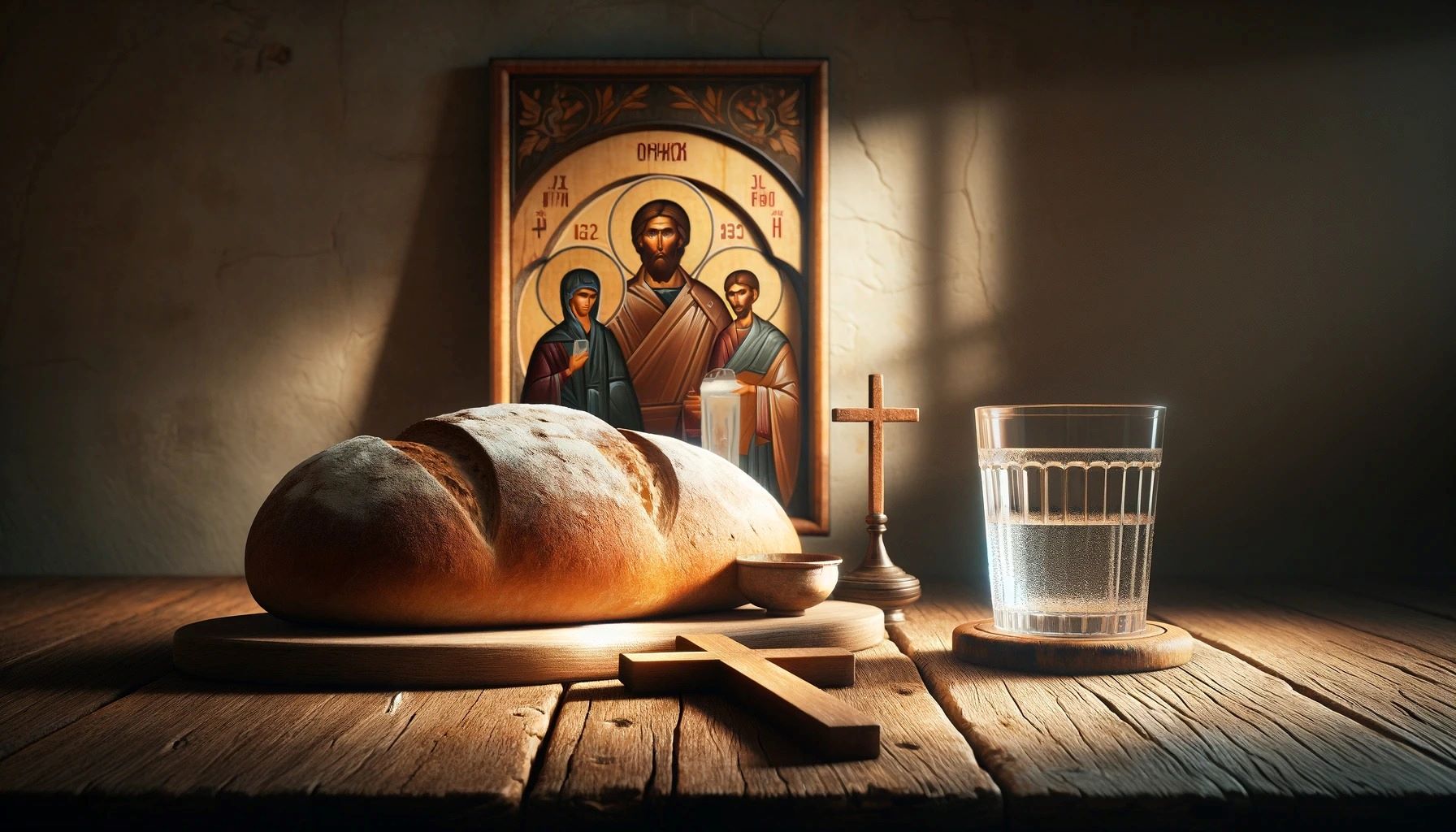Home>Special Themes>What Are The Rules Of Fasting During Lent


Special Themes
What Are The Rules Of Fasting During Lent
Published: February 27, 2024
Ericka Andersen, an editor at Christian.net, expertly merges digital strategy with content creation, focusing on faith and societal issues. Her communication skills enhance the platform's engaging narratives, fostering meaningful dialogue on belief's impact on society.
Learn about the rules of fasting during Lent and how to observe this special theme. Discover the traditions and guidelines for a meaningful Lenten season.
(Many of the links in this article redirect to a specific reviewed product. Your purchase of these products through affiliate links helps to generate commission for Christian.net, at no extra cost. Learn more)
Table of Contents
Introduction
What Are The Rules Of Fasting During Lent? Lent is a significant period in the Christian calendar, marked by fasting, prayer, and reflection. It is a time when many Christians prepare for Easter by observing a period of self-discipline and spiritual growth. Fasting during Lent is a common practice among various Christian denominations, but what are the specific rules that govern this tradition? In this article, we will explore the history of Lent and fasting, the purpose of fasting during Lent, the rules that guide this practice, exceptions to the fasting rules, and tips for observing Lenten fasting. Let's delve into the rich tradition of Lenten fasting and its significance in the Christian faith.
Read more: Why Fast During Lent
History of Lent and Fasting
Lent has its roots in the early Christian church, with evidence of the practice dating back to the second century. The word "Lent" itself comes from the Old English word "lencten," which means spring. The 40-day period of Lent mirrors the 40 days that Jesus spent fasting in the wilderness, as described in the Gospels of Matthew, Mark, and Luke. Initially, Lent was a time of preparation for new converts to Christianity, who would be baptized on Easter Sunday. Over time, the practice of Lenten fasting expanded to include all believers, serving as a period of spiritual discipline and self-examination.
Fasting has been a part of religious traditions across different cultures and faiths for centuries. In the Christian context, fasting during Lent became more structured and regulated as the church developed its liturgical calendar. The rules and guidelines for Lenten fasting evolved over time, with various Christian traditions and denominations adopting their own practices. Today, Lent is observed by Catholics, Eastern Orthodox Christians, Anglicans, Lutherans, and other Protestant denominations, each with its own variations on the practice of fasting.
The history of Lent and fasting is rich and multifaceted, reflecting the diverse tapestry of Christian traditions and the enduring significance of this period of spiritual devotion and self-denial. Understanding the historical context of Lenten fasting provides valuable insight into the deep-rooted traditions that continue to shape the faith and practices of millions of Christians around the world.
The Purpose of Fasting During Lent
Fasting during Lent serves multiple purposes within the Christian faith, encompassing spiritual, physical, and communal dimensions. Understanding the underlying reasons for this practice sheds light on its profound significance for believers.
- Spiritual Discipline: Lenten fasting is a form of spiritual discipline that encourages believers to engage in self-examination, repentance, and renewal. By voluntarily abstaining from certain foods or activities, individuals are prompted to reflect on their relationship with God, their personal behaviors, and their reliance on material comforts. This introspective process is central to the Lenten experience, fostering a deeper connection to one’s faith and a heightened awareness of spiritual priorities.
- Identification with Christ: Fasting during Lent allows Christians to identify with the sacrificial nature of Jesus Christ’s journey to the cross. By emulating Christ’s 40-day fast in the wilderness, believers enter into a period of solidarity with the Savior’s self-denial and preparation for his redemptive mission. This identification with Christ’s suffering and selflessness forms a fundamental aspect of Lenten observance, shaping the spiritual mindset of participants.
- Community and Solidarity: Lenten fasting is not solely an individual endeavor; it also fosters a sense of communal solidarity within the church. As believers collectively engage in fasting and prayer during this season, a shared sense of purpose and commitment emerges, strengthening the bonds of fellowship and mutual support. The communal aspect of Lenten fasting underscores the interconnectedness of the body of Christ and the shared journey toward spiritual growth and renewal.
- Physical and Mental Purification: The act of fasting involves a deliberate abstention from certain foods or indulgences, which can lead to physical and mental purification. By exercising restraint and self-control, individuals seek to purify their bodies and minds, redirecting their focus from material consumption to spiritual nourishment. This purification process aligns with the overarching theme of renewal and transformation that characterizes the Lenten season.
The multifaceted purpose of fasting during Lent underscores its integral role in the spiritual lives of Christians, offering a profound opportunity for self-examination, spiritual growth, and communal solidarity.
The Rules of Fasting During Lent
Fasting during Lent is guided by specific rules and practices that vary among different Christian traditions and denominations. While the specifics may differ, the overarching principles of Lenten fasting emphasize self-discipline, abstinence, and spiritual devotion. Understanding the rules that govern this practice provides clarity for individuals seeking to observe Lent in accordance with their faith tradition. Here are some common rules of fasting during Lent:
-
Abstinence from Meat: One of the most well-known rules of Lenten fasting involves abstaining from the consumption of meat, particularly on Ash Wednesday and Fridays during Lent. This practice of meatless Fridays is observed by Catholics and some other Christian denominations as a symbolic gesture of penance and self-denial. Instead of meat, individuals may opt for fish or vegetarian alternatives as a way of honoring this tradition.
-
Limited Food Intake: In addition to abstaining from meat, Lenten fasting often involves limiting the quantity of food consumed, particularly on Ash Wednesday and Good Friday. Some traditions advocate for one full meal and two smaller meals that, when combined, do not exceed the main meal in quantity. This practice of moderation and restraint reflects the spirit of self-discipline and spiritual focus that characterizes the Lenten season.
-
Abstention from Certain Foods: Beyond meat, Lenten fasting may entail abstaining from specific types of food or indulgences, such as sweets, rich desserts, or alcoholic beverages. The act of forgoing these items serves as a reminder of the solemnity of the Lenten period and the call to simplicity and self-denial.
-
Fasting from Non-Food Pleasures: Lenten fasting extends beyond dietary restrictions to encompass non-food-related activities or pleasures. This may include abstaining from forms of entertainment, reducing screen time, or engaging in acts of service and charity as a way of redirecting focus from worldly distractions to spiritual contemplation.
-
Personalized Fasting Practices: While there are general guidelines for Lenten fasting, individuals are encouraged to personalize their fasting practices based on their health, age, and personal circumstances. The emphasis is on the spirit of the fast rather than rigid adherence to specific rules, allowing for flexibility while upholding the core principles of self-discipline and spiritual devotion.
The rules of fasting during Lent are designed to foster a spirit of self-denial, spiritual reflection, and communal solidarity among believers. While the specifics may vary, the overarching goal is to create a focused and intentional approach to the Lenten season, culminating in a deeper connection to one's faith and a renewed sense of spiritual purpose.
Exceptions to the Fasting Rules
While Lenten fasting entails specific guidelines and practices, there are exceptions and considerations that accommodate individual circumstances and health needs. These exceptions are intended to ensure that the observance of Lent remains spiritually meaningful and accessible to all believers, regardless of their physical or logistical constraints. Understanding the exceptions to the fasting rules provides insight into the inclusive and adaptable nature of Lenten observance.
-
Health Considerations: Individuals with health conditions that require a regular and balanced diet, such as diabetes, pregnancy, or certain medical treatments, may be exempt from strict fasting practices. It is important for individuals to prioritize their health and well-being, seeking guidance from healthcare professionals and spiritual advisors to determine appropriate modifications to their fasting regimen.
-
Age and Developmental Stage: Children, the elderly, and individuals with specific dietary needs may be exempt from certain fasting requirements. The focus is on fostering a positive and age-appropriate Lenten experience for individuals at different stages of life, recognizing that the spirit of fasting can be expressed in diverse ways that align with individual capabilities and nutritional requirements.
-
Work and Physical Labor: Those engaged in strenuous physical labor or demanding work schedules may require adjustments to their fasting practices. The goal is to ensure that individuals can fulfill their occupational responsibilities while also participating in the spiritual observance of Lent, striking a balance between their professional duties and their commitment to fasting.
-
Pastoral Guidance and Dispensation: In some cases, individuals may seek pastoral guidance and dispensation from strict fasting rules due to unique circumstances or challenges. Pastors and spiritual leaders can provide counsel and discernment, offering tailored recommendations that honor the spirit of Lent while addressing the specific needs of their congregants.
-
Acts of Mercy and Charity: Engaging in acts of mercy, compassion, and charitable service is considered a meaningful expression of Lenten observance. For individuals who may face limitations in traditional fasting practices, the opportunity to contribute to the well-being of others through acts of kindness and generosity becomes a vital aspect of their Lenten journey.
The exceptions to the fasting rules underscore the compassionate and understanding nature of Lenten observance, recognizing the diverse circumstances and needs of individuals within the faith community. By embracing flexibility and inclusivity, the practice of Lenten fasting remains a deeply meaningful and accessible tradition for believers from all walks of life.
Read more: What Religions Fast During Lent
Tips for Observing Lenten Fasting
Observing Lenten fasting is a deeply personal and spiritual endeavor, and incorporating practical tips can enhance the experience and ensure a meaningful and fulfilling journey through this sacred season. Here are some valuable tips for individuals seeking to engage in Lenten fasting with intentionality and reverence:
-
Prayer and Reflection: Integrate regular prayer and moments of reflection into your daily routine. Use this time to connect with God, seek spiritual guidance, and contemplate the significance of the Lenten season. Prayer and reflection serve as pillars of support and inspiration as you navigate the challenges and rewards of fasting.
-
Mindful Meal Planning: Plan your meals mindfully, focusing on simple and nourishing options that align with the principles of Lenten fasting. Embrace plant-based recipes, wholesome grains, and nourishing soups as part of your dietary choices. Consider incorporating traditional fasting foods from various cultural and culinary traditions to enrich your fasting experience.
-
Educate and Engage: Take the opportunity to educate yourself and others about the spiritual and historical significance of Lenten fasting. Engage in conversations with fellow believers, participate in study groups, or explore relevant literature to deepen your understanding of this ancient practice and its relevance in the contemporary world.
-
Acts of Compassion: Use the Lenten season as a catalyst for acts of compassion and service to others. Engage in charitable initiatives, volunteer work, or support community outreach programs as a tangible expression of your commitment to selflessness and empathy during this period of fasting and reflection.
-
Fasting Beyond Food: Extend the concept of fasting beyond dietary restrictions to encompass other aspects of your life. Consider reducing screen time, limiting social media usage, or refraining from certain forms of entertainment as a way of redirecting your focus toward spiritual contemplation and self-discipline.
-
Accountability and Support: Seek accountability and support from fellow believers who are also observing Lenten fasting. Share your experiences, challenges, and triumphs with a trusted community of faith, and offer mutual encouragement and solidarity as you journey through this season together.
-
Cultivate Gratitude: Cultivate an attitude of gratitude throughout the Lenten period. Embrace the opportunity to express thankfulness for blessings, practice contentment with simplicity, and foster a spirit of generosity toward others, recognizing the abundance of spiritual nourishment that transcends material comforts.
-
Self-Reflection and Growth: Embrace the Lenten season as a time for personal growth and self-reflection. Identify areas of spiritual development, set meaningful goals for your Lenten journey, and commit to nurturing a deeper connection to your faith through introspection and self-examination.
-
Seek Spiritual Guidance: Consult with spiritual leaders, pastors, or mentors for guidance and support as you navigate the intricacies of Lenten fasting. Draw upon their wisdom and insight to enrich your understanding of the spiritual significance of fasting and to receive personalized counsel tailored to your individual circumstances.
-
Celebrate Easter Joyfully: As the Lenten season culminates in the celebration of Easter, approach this joyous occasion with a heart full of gratitude and renewed spiritual vitality. Embrace the resurrection of Christ as the pinnacle of the Christian faith, and rejoice in the transformative journey of Lent that has prepared your heart to experience the fullness of Easter's significance.
By incorporating these tips into your observance of Lenten fasting, you can enrich your spiritual journey, deepen your connection to your faith, and experience the profound significance of this sacred season in a meaningful and transformative manner.
Conclusion
In conclusion, the rules of fasting during Lent are deeply rooted in the historical and spiritual traditions of the Christian faith. Lenten fasting serves as a period of self-discipline, spiritual reflection, and communal solidarity, encompassing diverse purposes that resonate with believers across different denominations. The rules of fasting, including abstinence from meat, limited food intake, and personalized fasting practices, are designed to foster a focused and intentional approach to the Lenten season, culminating in a deeper connection to one's faith and a renewed sense of spiritual purpose. Understanding the exceptions to the fasting rules underscores the compassionate and understanding nature of Lenten observance, ensuring that the practice remains accessible and meaningful for individuals with diverse circumstances and needs. By incorporating practical tips for observing Lenten fasting, believers can enrich their spiritual journey, deepen their connection to their faith, and experience the profound significance of this sacred season in a meaningful and transformative manner. As the Lenten season culminates in the celebration of Easter, the journey of fasting and spiritual devotion prepares the hearts of believers to embrace the joy and significance of Christ's resurrection with gratitude and renewed spiritual vitality.














